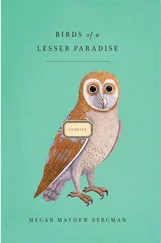Diana Abu-Jaber - Birds of Paradise
Здесь есть возможность читать онлайн «Diana Abu-Jaber - Birds of Paradise» весь текст электронной книги совершенно бесплатно (целиком полную версию без сокращений). В некоторых случаях можно слушать аудио, скачать через торрент в формате fb2 и присутствует краткое содержание. Год выпуска: 2010, ISBN: 2010, Издательство: Thorndike Press, Жанр: Современная проза, на английском языке. Описание произведения, (предисловие) а так же отзывы посетителей доступны на портале библиотеки ЛибКат.
- Название:Birds of Paradise
- Автор:
- Издательство:Thorndike Press
- Жанр:
- Год:2010
- ISBN:9781410445070
- Рейтинг книги:5 / 5. Голосов: 1
-
Избранное:Добавить в избранное
- Отзывы:
-
Ваша оценка:
- 100
- 1
- 2
- 3
- 4
- 5
Birds of Paradise: краткое содержание, описание и аннотация
Предлагаем к чтению аннотацию, описание, краткое содержание или предисловие (зависит от того, что написал сам автор книги «Birds of Paradise»). Если вы не нашли необходимую информацию о книге — напишите в комментариях, мы постараемся отыскать её.
Birds of Paradise — читать онлайн бесплатно полную книгу (весь текст) целиком
Ниже представлен текст книги, разбитый по страницам. Система сохранения места последней прочитанной страницы, позволяет с удобством читать онлайн бесплатно книгу «Birds of Paradise», без необходимости каждый раз заново искать на чём Вы остановились. Поставьте закладку, и сможете в любой момент перейти на страницу, на которой закончили чтение.
Интервал:
Закладка:
After the front of the property is cleared, Brian and Avis go into the backyard, pulling out fallen branches and fronds. The local businesses have started to reopen and will soon send their bakery orders, for which she is glad. But she isn’t quite ready to go back inside yet. Avis starts cleaning out the sprawling, wasted gardens Stanley had built, gathering brush, then weeding on her hands and knees for hours. The next day she returns to drag a metal trowel through the soil, over and over, until she is turning up fine, dry furrows, the soil sparkling. She leans toward the narrow rows and imagines the warm scent of planted tomatoes — it drifts into her senses as if they grew before her. She remembers the way Solange sat in the grass, the quick flint of her eyes, scanning the earth. It comes to her as she works that gardening is a way of staying put. That evening, Avis calls Stanley again and before he can vanish, she asks, “But Stan? Do you have one more minute?” She tells him about reviving his old gardens, how beautiful the clean plots are, and how she’d imagined the scent of tomatoes. He chuckles. “Oh yeah. That’s how it gets you. One second, you’re fooling around in the dirt, next thing you know you’re up to your ears in squash and parsley.”
“Could I do that? Squash?” She realizes that is just what she wants to do.
Stanley is drawn into it, despite himself: she can hear him give way to his old love of gardening. His voice warms with interest as he tells her how to amend the soil, the importance of organic compost, how to determine the best sun exposure, the uses of earthworms. She gets out paper and takes notes. They talk for over an hour, losing themselves in the discussion of vegetables, berries, herbs, their voices running together, trading ideas, the way they did in the days when Stanley assisted in her kitchen.
Avis says, “I thought it’d be fun to start from seeds.”
“Sure, sure, just to make it as hard as possible.”
“Isn’t that the whole point?” She’s laughing. “Seedlings are for wimps.”
Then Stanley says, “Yeah, well, why don’t you come here. We’ve got good heirloom seeds at the market. I’ll be around tomorrow. Bring Dad too, why not?”
When she gets off the phone, Avis is still smiling, excited to tell Brian about this invitation — a sense of being readmitted to Stanley’s life. But that night, Avis sits up late in the kitchen, moon glowing in the window, fretting over what to bring them. She feels nervous as a teenager worrying over a prom dress. She lingers over the cards in her notebooks — scraps of recipes tucked behind plastic sleeves — an enormous collection she’s curated for years. She turns the pages slowly, in an agony of indecision, wanting to make them something perfect and beautiful. She considers a tray of flaky jésuites, their centers redolent of frangipani cream, decorated with violet buds preserved in clouds of black crystal sugar. Or dulce de leche tarts — caramelized swirls on a pâte sucrée crust, glowing with chocolate, tiny muted peaks, ruffles of white pastry like Edwardian collars. But nothing seems special enough and nothing seems right. Nothing seems like Stanley. Avis brings out the meticulous botanical illustrations she did in school, pins them all around the kitchen like a room from Audubon’s house. She thinks of slim layers of chocolate interspersed with a vanilla caramel. On top she might paint a frosted forest with hints of white chocolate, dashes of rosemary subtle as déjà vu. A glissando of light spilling in butter-drops from one sweet lime leaf to the next. On a drawing pad she uses for designing wedding cakes, she begins sketching ruby-throated hummingbirds in flecks of raspberry fondant, a sub-equatorial sun depicted in neoclassical butter cream. At the center of the cake top, she draws figures regal and languid as Gauguin’s island dwellers, meant to be Stanley, Nieves, and child. Their skin would be cocoa and coffee and motes of cherry melded with a few drops of cream. Then an icing border of tiny mermaids, nixies, selkies, and seahorses below, Pegasus, Icarus, and phoenix above.
You are lucky, Avis’s mother told her, if you know what in this life you’re hunting for. Avis has always known her hunt. She believes that her work is hard and essential, like that of nurse, firefighter, carpenter: she’ll be needed after the collapse of civilization. Not the same as building houses, but still a crucial grace note. Avis exerts herself wholly and physically to produce an evanescence of sugar and butter — a phoenix’s wing. She’s proud to bring people the reprieve of a slice of torte, a bite of scone: a sort of remedy. Just enough to keep everyone going.
But Avis doesn’t move. She’s sunburned from kneeling in the garden and her back and arms ache. She stares at the cake sketches, and now they look gaudy, almost baroque. None of this interests her son. The cake fantasies seem like an indictment of her career: she sees herself drawing sweet vapors through the air, outlining the contours of a sugar castle. A bare, dry place in which to live. Too much sweetness, it occurs to her, is almost worse than too little. Swept by remorse, she presses her knuckles against her mouth. The moon is so bright it seems hot and the streetlights outside burn like match heads. Her eyes film with tears. Finally Brian is at the kitchen door. “Avis?” He comes to her side and slides his arms around her. “Come to bed, sweetheart,” he murmurs. “Leave the cake for now.”
IT’S BEEN OVER A year since they’ve last visited their son’s market. As they walk through the parking lot they take in a number of improvements. Brian admires the raised garden beds made of cedar planks that flank the sides of the lot. There are stalks of tomatoes, staked beans, baskets of green herbs — oregano, lavender, fragrant blades of lemongrass and pointed curry leaf. The planter of baby lettuces has a chalkboard hung from its side: Just add fork . A wheelbarrow parked by the door is heaped with bright coronas of sunflowers, white daisies, jagged red ginger and birds-of-paradise. Avis feels a leap of pride as they enter the market: the floor of polished bamboo, the sky-blue ceiling, the wooden shelves — like bookshelves in a library. And the smells. Warm, round billows of baking bread, roasting garlic and onions and chicken. The doorframe to Stanley’s office is an inlaid mosaic of seashells — a surprise from three volunteers who’d worked on it through the night.
Still, Avis feels naked without a bakery box, her arms empty. This is not me, she thinks. Instead they come bearing a cashier’s check: the full amount Stanley and Nieves requested. She feels diminutive and humble inside the vast green world her son has created; timid about making this late offering. At the back of the store, they hear voices through the office door, and for a moment Avis has an anxious impulse, a thought of simply turning and going home. But Brian knocks and calls, “Hey Stan?”
As they walk into the room, Avis senses something, a frequency of sound or light like an echo chased out of the walls. Before her, a young woman is leaning on Stanley’s big, messy desk, her eyes like sea glass, her hair whip-dark. So lovely she seems impossible — dreamed-up. Avis gazes at her and experiences a rush of sensation as if a river flashed through her body, before she understands who this is.
Felice is talking with someone, joking, when she looks over. Avis thinks, Stanley hadn’t warned her either.
Brian wavers beside her. “Oh. Daddy.” Her voice is nearly inaudible as she moves away from the desk and hesitates before her father. Her face has a red, streaky quality. Avis is about to warn him: Don’t touch. Because she might run away! But the dream of her seems to become permeable because he walks through it, right through the old rules, of distance and untouchability. He embraces and holds her for a long, silent time. And Avis realizes then that her daughter did know — she’d agreed to this meeting. Brian’s face is tipped to the top of her head, her small hands high on his shoulder blades. Felice seems to be trembling, fragile as a star, and Avis hears her say, as if brokenhearted, “I’m sorry, I’m sorry.” And seeing this seal or separation break between Felice and Brian, Avis understands that in some way the world has finally shifted.
Читать дальшеИнтервал:
Закладка:
Похожие книги на «Birds of Paradise»
Представляем Вашему вниманию похожие книги на «Birds of Paradise» списком для выбора. Мы отобрали схожую по названию и смыслу литературу в надежде предоставить читателям больше вариантов отыскать новые, интересные, ещё непрочитанные произведения.
Обсуждение, отзывы о книге «Birds of Paradise» и просто собственные мнения читателей. Оставьте ваши комментарии, напишите, что Вы думаете о произведении, его смысле или главных героях. Укажите что конкретно понравилось, а что нет, и почему Вы так считаете.












